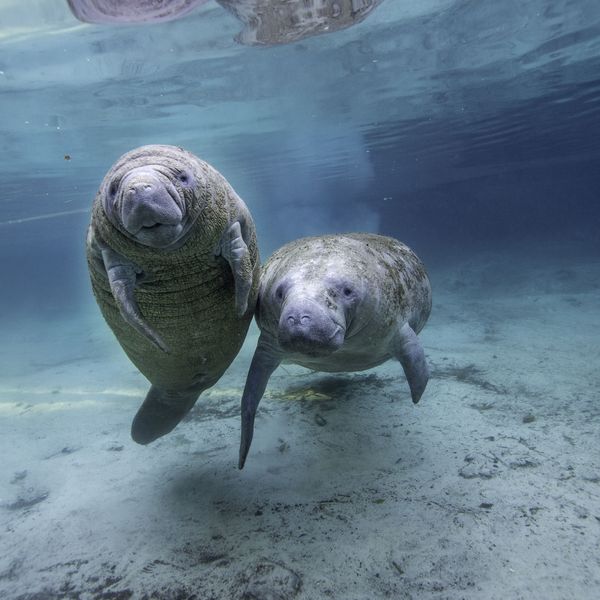Report: Climate Change Has Already Brought Catastrophe to US Wildlife
'Only by rejecting dirty energy and embracing clean energy solutions — will we begin to alter the path we are on to catastrophic climate change.'
Climate change has already pushed the nation's wildlife into crisis, according to a report released Wednesday from the National Wildlife Federation (NWF), and further catastrophe, including widespread extinction, can only be curbed with swift action to curb the carbon pollution that has the planet sweltering.
Entitled Wildlife in a Warming World: Confronting the Climate Crisis, the report looks at 8 regions across the U.S. where "the underlying climatic conditions to which species have been accustomed for thousands of years," the report explains, have been upturned by human-caused climate change.
"Some of America's most iconic species--from moose to sandhill cranes to sea turtles - are seeing their homes transformed by rapid climate change," stated Dr. Amanda Staudt, climate scientist at the National Wildlife Federation.
Among the impacts the report details:
Arctic: Reduction is sea ice is having a dramatic impact on polar bears, and "the increasing distance between land and the offshore sea ice creates a perilously long swim--some as long as 12 excruciating days--that can result in drowning of both adults and their cubs."
Western Forests: Increasingly frequent and severe wildfires are bringing cascading effects to wildlife and their ecosystems, with wildlife struggling to find suitable habitat in the aftermath, and ash from the fires contaminating water sources and the aquatic life within them.
Great Plains: Climate change-caused heatwaves and drought are bringing large fish die-offs, and the increased heat in northern areas like Minnesota is impacting moose, which seek shelter in extreme heat rather than forage for needed nutrients. The moose also suffer from tick infestations, on the rise due to increased temperatures, which cause the animals blood loss and bare patches on their protective hair.
Atlantic Coasts: This area "will experience some of the most direct and costly impacts of climate change, including rising sea levels, warming ocean waters, enhanced coastal storms, and ocean acidification, all of which place both natural systems and coastal communities at risk." Warming waters are already pushing some fish species to move their habitats further north to cooler waters, while the warmer waters could spell doom for sea turtles, as sea turtle hatchlings' gender is temperature-dependent.
"We can't leave this problem for our children and grandchildren to fix - they'll judge us based on what we do now," stated Larry Schweiger, president and CEO of the National Wildlife Federation.
Staudt adds, "Climate disruption is the most serious threat facing America's wildlife and requires action at the local, state and federal levels."
Writing on the NWF blog Wildlife Promise, Corey Shott, who works with the group's Climate and Energy Program, responds to the report with a call for greater and immediate climate action:
If 2012 was a wake-up call for the American people -- with devastating drought, intense wildfires, and destructive storms -- then 2013 must be a wake-up call for policymakers to finally take swift, bold action to reduce the carbon pollution heating the planet and properly deal with the unavoidable impacts of an already changing climate. [...]
Only by taking the threat seriously -- by rejecting dirty energy and embracing responsible, clean energy solutions -- will we begin to alter the path we are on to catastrophic climate change.
* * *
Read the full report below or here as a .pdf:
__________________________
An Urgent Message From Our Co-Founder
Dear Common Dreams reader, The U.S. is on a fast track to authoritarianism like nothing I've ever seen. Meanwhile, corporate news outlets are utterly capitulating to Trump, twisting their coverage to avoid drawing his ire while lining up to stuff cash in his pockets. That's why I believe that Common Dreams is doing the best and most consequential reporting that we've ever done. Our small but mighty team is a progressive reporting powerhouse, covering the news every day that the corporate media never will. Our mission has always been simple: To inform. To inspire. And to ignite change for the common good. Now here's the key piece that I want all our readers to understand: None of this would be possible without your financial support. That's not just some fundraising cliche. It's the absolute and literal truth. We don't accept corporate advertising and never will. We don't have a paywall because we don't think people should be blocked from critical news based on their ability to pay. Everything we do is funded by the donations of readers like you. Will you donate now to help power the nonprofit, independent reporting of Common Dreams? Thank you for being a vital member of our community. Together, we can keep independent journalism alive when it’s needed most. - Craig Brown, Co-founder |
Climate change has already pushed the nation's wildlife into crisis, according to a report released Wednesday from the National Wildlife Federation (NWF), and further catastrophe, including widespread extinction, can only be curbed with swift action to curb the carbon pollution that has the planet sweltering.
Entitled Wildlife in a Warming World: Confronting the Climate Crisis, the report looks at 8 regions across the U.S. where "the underlying climatic conditions to which species have been accustomed for thousands of years," the report explains, have been upturned by human-caused climate change.
"Some of America's most iconic species--from moose to sandhill cranes to sea turtles - are seeing their homes transformed by rapid climate change," stated Dr. Amanda Staudt, climate scientist at the National Wildlife Federation.
Among the impacts the report details:
Arctic: Reduction is sea ice is having a dramatic impact on polar bears, and "the increasing distance between land and the offshore sea ice creates a perilously long swim--some as long as 12 excruciating days--that can result in drowning of both adults and their cubs."
Western Forests: Increasingly frequent and severe wildfires are bringing cascading effects to wildlife and their ecosystems, with wildlife struggling to find suitable habitat in the aftermath, and ash from the fires contaminating water sources and the aquatic life within them.
Great Plains: Climate change-caused heatwaves and drought are bringing large fish die-offs, and the increased heat in northern areas like Minnesota is impacting moose, which seek shelter in extreme heat rather than forage for needed nutrients. The moose also suffer from tick infestations, on the rise due to increased temperatures, which cause the animals blood loss and bare patches on their protective hair.
Atlantic Coasts: This area "will experience some of the most direct and costly impacts of climate change, including rising sea levels, warming ocean waters, enhanced coastal storms, and ocean acidification, all of which place both natural systems and coastal communities at risk." Warming waters are already pushing some fish species to move their habitats further north to cooler waters, while the warmer waters could spell doom for sea turtles, as sea turtle hatchlings' gender is temperature-dependent.
"We can't leave this problem for our children and grandchildren to fix - they'll judge us based on what we do now," stated Larry Schweiger, president and CEO of the National Wildlife Federation.
Staudt adds, "Climate disruption is the most serious threat facing America's wildlife and requires action at the local, state and federal levels."
Writing on the NWF blog Wildlife Promise, Corey Shott, who works with the group's Climate and Energy Program, responds to the report with a call for greater and immediate climate action:
If 2012 was a wake-up call for the American people -- with devastating drought, intense wildfires, and destructive storms -- then 2013 must be a wake-up call for policymakers to finally take swift, bold action to reduce the carbon pollution heating the planet and properly deal with the unavoidable impacts of an already changing climate. [...]
Only by taking the threat seriously -- by rejecting dirty energy and embracing responsible, clean energy solutions -- will we begin to alter the path we are on to catastrophic climate change.
* * *
Read the full report below or here as a .pdf:
__________________________
Climate change has already pushed the nation's wildlife into crisis, according to a report released Wednesday from the National Wildlife Federation (NWF), and further catastrophe, including widespread extinction, can only be curbed with swift action to curb the carbon pollution that has the planet sweltering.
Entitled Wildlife in a Warming World: Confronting the Climate Crisis, the report looks at 8 regions across the U.S. where "the underlying climatic conditions to which species have been accustomed for thousands of years," the report explains, have been upturned by human-caused climate change.
"Some of America's most iconic species--from moose to sandhill cranes to sea turtles - are seeing their homes transformed by rapid climate change," stated Dr. Amanda Staudt, climate scientist at the National Wildlife Federation.
Among the impacts the report details:
Arctic: Reduction is sea ice is having a dramatic impact on polar bears, and "the increasing distance between land and the offshore sea ice creates a perilously long swim--some as long as 12 excruciating days--that can result in drowning of both adults and their cubs."
Western Forests: Increasingly frequent and severe wildfires are bringing cascading effects to wildlife and their ecosystems, with wildlife struggling to find suitable habitat in the aftermath, and ash from the fires contaminating water sources and the aquatic life within them.
Great Plains: Climate change-caused heatwaves and drought are bringing large fish die-offs, and the increased heat in northern areas like Minnesota is impacting moose, which seek shelter in extreme heat rather than forage for needed nutrients. The moose also suffer from tick infestations, on the rise due to increased temperatures, which cause the animals blood loss and bare patches on their protective hair.
Atlantic Coasts: This area "will experience some of the most direct and costly impacts of climate change, including rising sea levels, warming ocean waters, enhanced coastal storms, and ocean acidification, all of which place both natural systems and coastal communities at risk." Warming waters are already pushing some fish species to move their habitats further north to cooler waters, while the warmer waters could spell doom for sea turtles, as sea turtle hatchlings' gender is temperature-dependent.
"We can't leave this problem for our children and grandchildren to fix - they'll judge us based on what we do now," stated Larry Schweiger, president and CEO of the National Wildlife Federation.
Staudt adds, "Climate disruption is the most serious threat facing America's wildlife and requires action at the local, state and federal levels."
Writing on the NWF blog Wildlife Promise, Corey Shott, who works with the group's Climate and Energy Program, responds to the report with a call for greater and immediate climate action:
If 2012 was a wake-up call for the American people -- with devastating drought, intense wildfires, and destructive storms -- then 2013 must be a wake-up call for policymakers to finally take swift, bold action to reduce the carbon pollution heating the planet and properly deal with the unavoidable impacts of an already changing climate. [...]
Only by taking the threat seriously -- by rejecting dirty energy and embracing responsible, clean energy solutions -- will we begin to alter the path we are on to catastrophic climate change.
* * *
Read the full report below or here as a .pdf:
__________________________

